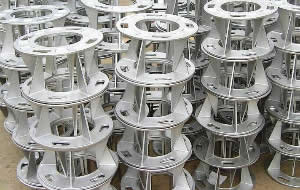Ideal Practices for Maintenance and Applications in the Light Weight Aluminum Shop Field: A Detailed Overview
Maintaining equipment in the light weight aluminum shop sector is essential for functional success. Regular evaluations and predictive upkeep can significantly minimize downtime and boost safety. Advanced innovations, such as IoT and information analytics, play a crucial duty in this procedure. Comprehending the complete scope of finest techniques requires a closer assessment of particular methods and their impacts on efficiency. What are the important parts that contribute to a trusted upkeep framework?
Importance of Routine Upkeep in Light Weight Aluminum Foundries
Regular maintenance plays an important function in the effective operation of aluminum shops. By systematically examining and servicing devices, foundries guarantee peak efficiency and durability of equipment. Normal upkeep activities, such as lubrication, cleaning, and component substitute, assistance protect against unforeseen breakdowns that can cause pricey downtime.
Regular checks improve work environment security by determining potential threats prior to they intensify right into severe issues. Devices that is properly maintained operates extra properly, resulting in enhanced product high quality and minimized waste. Additionally, adherence to an organized maintenance timetable can sustain conformity with market laws, consequently promoting a credibility for dependability and high quality within the market.
Implementing Anticipating Maintenance Methods
Predictive maintenance methods take the principles of routine maintenance a step even more by leveraging data analytics and advanced monitoring innovations. In aluminum factories, these strategies make it possible for drivers to anticipate equipment failures prior to they happen, consequently reducing unplanned downtimes and optimizing functional efficiency. By using sensors and IoT devices, real-time information can be collected on machine efficiency, enabling the identification of prospective concerns with predictive analytics.
Enhancing Melting and Putting Processes
Efficient melting and pouring procedures are essential for making best use of productivity and ensuring the top quality of aluminum spreadings. To improve these processes, shops should concentrate on precise temperature level control during melting, as this straight influences the metallurgical residential or commercial properties of the alloy. Making use of sophisticated melting innovations, such as induction and resistance melting, can improve energy effectiveness and lower cycle times.
Moreover, executing automated pouring systems reduces human error and preserves consistency in the putting procedure. Appropriate mold and mildew prep work, including appropriate preheating, is necessary to protect against thermal shock and boost mold longevity.

Enhancing Safety And Security Methods in Foundry Operations
Focusing on security in aluminum factory operations is important for securing workers and assuring an efficient atmosphere. Efficient safety and security methods consist of normal training sessions that stress the relevance of personal safety tools (PPE), such as helmets, goggles, and gloves. Furthermore, the establishment of clear emergency situation treatments is necessary in taking care of possible mishaps.
Regular evaluations of tools and machinery assistance determine dangers before they intensify page right into serious concerns. Implementing a robust coverage system urges employees to interact safety worries without fear of repercussion. Fostering a society of security assurances that every employee understands their duty in keeping a safe workplace.
On top of that, guaranteeing correct air flow and monitoring air quality can mitigate exposure to damaging fumes and dust. By strengthening these techniques, aluminum foundries can greatly reduce the risk of mishaps and create an atmosphere where workers feel valued and risk-free, inevitably boosting general operational efficiency.
Leveraging Innovation for Improved Effectiveness
Utilizing innovative technology has actually become increasingly crucial for aluminum foundries aiming to enhance operational effectiveness. Automation and robotics play a crucial duty in simplifying production processes, reducing labor expenses, and reducing human error. Carrying out real-time tracking systems permits the this article constant assessment of equipment performance, allowing aggressive maintenance and decreasing downtime.
The combination of data analytics provides useful understandings right into operational process, helping with better decision-making and source allotment. Anticipating analytics can identify possible failings prior to they take place, more maximizing maintenance timetables.
Furthermore, taking on innovative melting and casting innovations enhances power performance and material yield, which are basic for sustainability in the market. By welcoming these technological developments, light weight aluminum foundries can not only enhance efficiency yet likewise keep an one-upmanship in a significantly requiring market (aluminum foundry). Ultimately, leveraging modern technology is critical in driving advancement and improving overall operational effectiveness within the sector

Regularly Asked Questions
What Are Common Indications of Equipment Put On in Aluminum Foundries?
Common indicators of devices wear in light weight aluminum foundries consist of uncommon noises, decreased performance, boosted vibration, overheating components, leaks, and visible corrosion. These indications commonly signal the need for maintenance or possible replacement to avoid expensive downtime.
Exactly How Can I Train Staff for Effective Upkeep Practices?
To educate team for effective maintenance practices, one can execute hands-on workshops, develop comprehensive manuals, urge mentorship programs, and conduct regular evaluations to assess abilities and understanding, making sure all workers understand upkeep protocols completely.
What Are the Environmental Rules for Light Weight Aluminum Foundries?
Light weight aluminum factories undergo various environmental regulations, including emissions control, waste monitoring, and source conservation. Compliance warranties marginal environmental effect, advertising sustainability while adhering to neighborhood, nationwide, and global environmental requirements and regulations.
Exactly How Do Foundries Manage Waste and Recycling of Aluminum?
Factories manage waste and recycling by executing systems for accumulating scrap light weight aluminum, utilizing innovative separation modern technologies, and teaming up with reusing centers to ensure reliable recovery processes, over here thereby decreasing ecological influence and advertising sustainability within the industry.
What Are the Expenses Connected With Executing Advanced Technologies?
Applying advanced technologies in factories sustains significant expenses, including first financial investment, training, and maintenance expenditures. The long-term benefits, such as increased effectiveness and reduced waste, frequently warrant these expenses, leading to enhanced productivity. (aluminum foundry)
